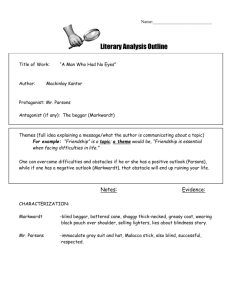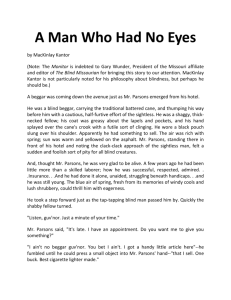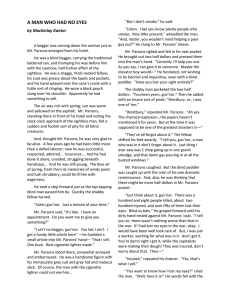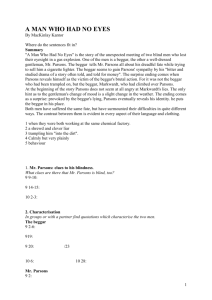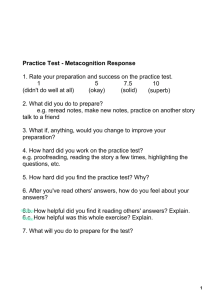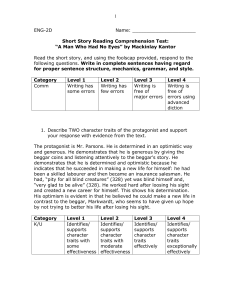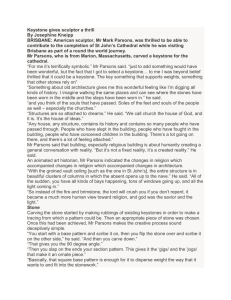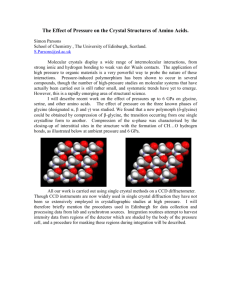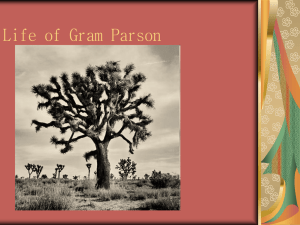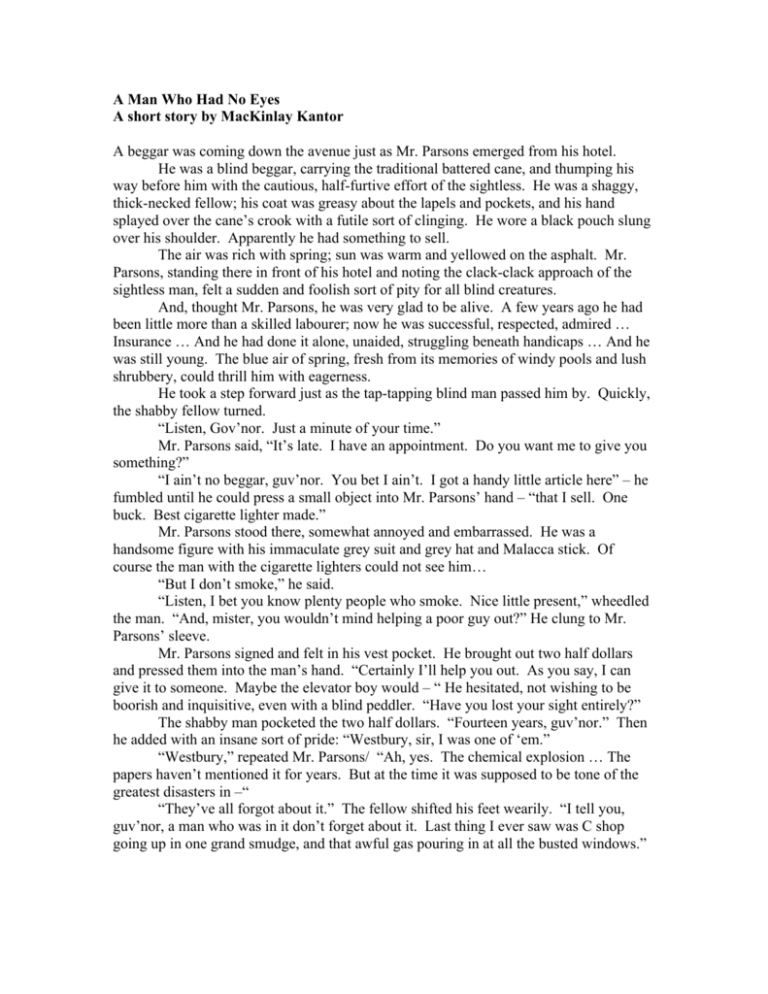
A Man Who Had No Eyes
A short story by MacKinlay Kantor
A beggar was coming down the avenue just as Mr. Parsons emerged from his hotel.
He was a blind beggar, carrying the traditional battered cane, and thumping his
way before him with the cautious, half-furtive effort of the sightless. He was a shaggy,
thick-necked fellow; his coat was greasy about the lapels and pockets, and his hand
splayed over the cane’s crook with a futile sort of clinging. He wore a black pouch slung
over his shoulder. Apparently he had something to sell.
The air was rich with spring; sun was warm and yellowed on the asphalt. Mr.
Parsons, standing there in front of his hotel and noting the clack-clack approach of the
sightless man, felt a sudden and foolish sort of pity for all blind creatures.
And, thought Mr. Parsons, he was very glad to be alive. A few years ago he had
been little more than a skilled labourer; now he was successful, respected, admired …
Insurance … And he had done it alone, unaided, struggling beneath handicaps … And he
was still young. The blue air of spring, fresh from its memories of windy pools and lush
shrubbery, could thrill him with eagerness.
He took a step forward just as the tap-tapping blind man passed him by. Quickly,
the shabby fellow turned.
“Listen, Gov’nor. Just a minute of your time.”
Mr. Parsons said, “It’s late. I have an appointment. Do you want me to give you
something?”
“I ain’t no beggar, guv’nor. You bet I ain’t. I got a handy little article here” – he
fumbled until he could press a small object into Mr. Parsons’ hand – “that I sell. One
buck. Best cigarette lighter made.”
Mr. Parsons stood there, somewhat annoyed and embarrassed. He was a
handsome figure with his immaculate grey suit and grey hat and Malacca stick. Of
course the man with the cigarette lighters could not see him…
“But I don’t smoke,” he said.
“Listen, I bet you know plenty people who smoke. Nice little present,” wheedled
the man. “And, mister, you wouldn’t mind helping a poor guy out?” He clung to Mr.
Parsons’ sleeve.
Mr. Parsons signed and felt in his vest pocket. He brought out two half dollars
and pressed them into the man’s hand. “Certainly I’ll help you out. As you say, I can
give it to someone. Maybe the elevator boy would – “ He hesitated, not wishing to be
boorish and inquisitive, even with a blind peddler. “Have you lost your sight entirely?”
The shabby man pocketed the two half dollars. “Fourteen years, guv’nor.” Then
he added with an insane sort of pride: “Westbury, sir, I was one of ‘em.”
“Westbury,” repeated Mr. Parsons/ “Ah, yes. The chemical explosion … The
papers haven’t mentioned it for years. But at the time it was supposed to be tone of the
greatest disasters in –“
“They’ve all forgot about it.” The fellow shifted his feet wearily. “I tell you,
guv’nor, a man who was in it don’t forget about it. Last thing I ever saw was C shop
going up in one grand smudge, and that awful gas pouring in at all the busted windows.”
Mr. Parsons coughed, but the blind peddler was caught up with the train of his
one dramatic reminiscence. And, also, he was thinking that there might be more half
dollars in Mr. Parsons’ pocket.
“Just think about it, guv’nor. There was a hundred and eight people killed, about
two hundred injured, and over fifty of them lost their eyes. Blind as bats.” He grouped
forward until his dirty hand rested against Mr. Parson’s coat. “I tell you sir, there wasn’t
nothing worse than that in the war. If I had lost my eyes in the war, okay. I would have
been well took care of. But I was just a worker, working for what was in it. And I got it.
You’re so right I got it, while others were making their dough! They was insured, don’t
worry about that. They – “
“Insured,” repeated his listener. “Yes. That’s what I sell -“
“You want to know how I lost my eyes?” cried the man. “Well, here it is!” His
words fell with the bitter and studied drama of a story often told, and told for money. “I
was there in C shop, last of the folks rushing out. Out in the air there was a chance, even
with buildings exploding right and left. A lot guys made it safe out the door and got
away. And just when I was about there, crawling along between those big vats, a guy
behind me grabs my leg. He says, ‘Let me pass, you -!’ Maybe he was nuts. I dunno. I
try to forgive him in my heart, guv’nor. But he was bigger than me. He hauls me back
and climbs right over me! Tramples me into the dirt. And he gets out, and I lie there
with all that poison gas pouring down on all sides of me, and flame and stuff …” He
swallowed – a studied sob – and stood dumbly expectant. He could imagine the next
words: Tough luck, my man. Now, I want to – “That’s my story, guv’nor.”
The spring wind shrilled past them, damp and quivering.
“Not quite,” said Mr. Parsons.
The blind peddler shivered crazily. “Not quite? What do you mean, you -?”
“The story is true,” Mr. Parsons said, “except it was the other way around.”
“Other way around,” he croaked unamiably. “Say, gov’nor…”
“I was in C shop,” said the Mr. Parsons. “It was the other way around. You were
the fellow who hauled back on me and climbed over me. You were bigger than I was,
Markwardt.”
The blind man stood for a long time, swallowing hoarsely. He gulped: “Parsons.
By heaven. By heaven! I thought you – “ And then he screamed fiendishly: “Yes.
Maybe so. Maybe so. But I’m blind! I’m blind, and you’ve been standing there letting
me spout to you, and laughing at me every minute! I’m blind!”
People in the street turned to stare at him.
“You got away, but I’m blind! Do you hear? I’m –“
“Well,” said Mr. Parsons, “don’t make such a row about it, Markwardt ... So am
I.”
MacKinlay Kantor: Born 1904, Webster City, Iowa: Died 1977
He worked for several newspapers, wrote scenarios for motion picture studios, was a war
correspondent, and is the author of many novels and short stories. Kantor won the
Pulitzer Prize for his novel, Andersonville in 1956.
A MAN WHO HAD NO EYES Questions
English 11
1.
2.
3.
4.
5.
6.
7.
8.
9.
10.
What is Mr. Parsons’ profession? Why is he proud of himself?
What indications show that Mr. Parsons is a wealthy, successful man?
What was Westbury? What happened there?
Define the term foreshadowing. Working in pairs identify specific details that
foreshadow the end of the story.
Why does the blind beggar tell Mr. Parsons his story? How does he expect Mr.
Parsons to react?
Who is Markwardt?
How is Mr. Parsons’ story different from the beggar’s?
Dramatic irony often occurs when a character is acting inappropriately because
he/she misunderstands the situation. What is it that the beggar does not
understand when he accuses Mr. Parsons of laughing at him?
Discuss the differences between the characters of Mr. Parsons and beggar? Refer
to their character traits and their actions.
People often edit their memories of the past to block out painful episodes and
cover up guilt. Explain how “selective memory” has been used in this story.
FORESHADOWING
fore·shad·ow vt
to indicate or suggest something, usually something unpleasant, that is going to happen.
IRONY
i·ro·ny n
1.
a type of humor based on using words to suggest the opposite of their literal
meaning
2.
something said or written that uses sardonic humor
3.
incongruity between what actually happens and what might be expected to
happen, especially when this disparity seems absurd or laughable
4.
something that happens that is incongruous with what might be expected to
happen, especially when this seems absurd or laughable.
dra·mat·ic i·ro·ny n
a situation, or the irony arising from a situation, in which the audience has a fuller
knowledge of what is happening in a drama than a character does
Encarta® World English Dictionary © 1999 Microsoft Corporation. All rights reserved.
Developed for Microsoft by Bloomsbury Publishing Plc.

